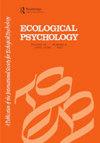多物种纠缠中的可视性
IF 1.7
3区 心理学
Q3 PSYCHOLOGY, EXPERIMENTAL
引用次数: 4
摘要
摘要随着塑料在海洋中流通,动物在世界上失去了位置,共享世界的脆弱和不确定的方面变得显而易见。可供性的概念,是生态心理学的核心,意味着捕捉世界提供的行动的可能性。它为人类和非人类动物提出了一种实用的世界概念。因此,它完全可以预测“多物种纠缠”的脆弱性,这是一个由多个物种跨代共享的世界。然而,到目前为止,世界上这些不确定的方面很少受到关注。通过将生态心理学中的进化思维和动物灭绝的民族志工作结合起来,本文探索了一种可供性的方法,以揭示共享世界的混乱方面。从这个观点来看,启示通过邀请动物参与到我们共同的世界中来,有助于实现和维护我们的世界。随着世界和动物在多个时间尺度上的形成,造林是未完成的,永远处于共同发展的过程中。文章以两个具体的例子结束,这些例子表明了这种可供性观点所强调的脆弱性,以及它要求人类生活在多物种纠缠中承担的责任。本文章由计算机程序翻译,如有差异,请以英文原文为准。
Affordances in a Multispecies Entanglement
Abstract As plastics circulate the oceans and animals lose their place in the world, the fragile and indeterminate aspects of the shared world become palpable. The concept of affordances, central to ecological psychology, means to capture the possibilities for action that the world offers. It suggests a pragmatic conceptualization of the world for human and non-human animals alike. As such it is perfectly positioned to foreground the fragility of a “multispecies entanglement,” a world shared with multiple species across generations. These indeterminate aspects of the world have so far however received little attention. By bringing together evolutionary thinking in ecological psychology and ethnographical work on animal extinction, this article explores one way for affordances to bring out the messy aspects of the shared world. On this view affordances help to achieve and maintain our shared world by inviting animals to participate in that world. Affordances are unfinished, perpetually in a process of co-becoming as world and animals take shape across multiple timescales. The article ends with two concrete examples that show the fragility that this view of affordances highlights, and the responsibility it requires of human life in a multispecies entanglement.
求助全文
通过发布文献求助,成功后即可免费获取论文全文。
去求助
来源期刊

Ecological Psychology
PSYCHOLOGY, EXPERIMENTAL-
CiteScore
3.30
自引率
10.50%
发文量
8
期刊介绍:
This unique journal publishes original articles that contribute to the understanding of psychological and behavioral processes as they occur within the ecological constraints of animal-environment systems. It focuses on problems of perception, action, cognition, communication, learning, development, and evolution in all species, to the extent that those problems derive from a consideration of whole animal-environment systems, rather than animals or their environments in isolation from each other. Significant contributions may come from such diverse fields as human experimental psychology, developmental/social psychology, animal behavior, human factors, fine arts, communication, computer science, philosophy, physical education and therapy, speech and hearing, and vision research.
 求助内容:
求助内容: 应助结果提醒方式:
应助结果提醒方式:


